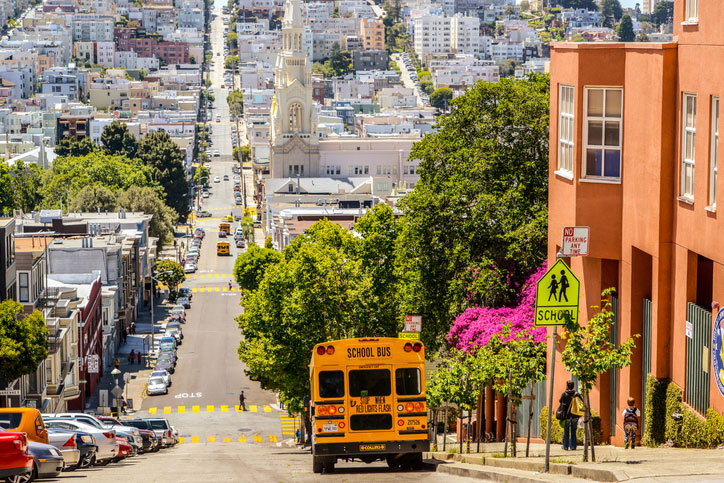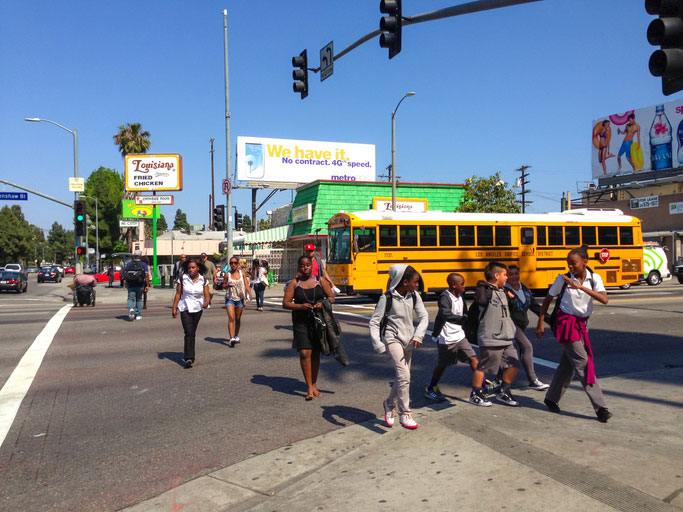Written by Sam Medley

Schools and universities across California have a need for the special skills of social workers, who can bring together teachers, administrators, school support staff, families, and communities to effectively promote students’ academic success.
To accomplish their shared goals, they promote a holistic understanding of the factors that undermine even the most well-designed curriculum.
In order for students to grow intellectually, they must have adequate support in all areas of their lives. School social workers have the unique training and ability to address these areas, including students’ social and emotional well-being, promoting equality in educational settings, and fostering an environment of respect in the classroom, at home, and in the community at large.
Whether a school social worker practices on a micro-level with individuals and groups or on a macro-level where they contribute to large-scale systemic operations, the guiding principles established by the National Association of Social Workers (NASW) ensure that they apply interventions with consideration for each student’s environment and its impact on their psychological and emotional state.
It’s this philosophy that prompted USC’s Suzanne Dworak-Peck School of Social Work to include a focus on trauma informed interventions in its Master of Social Work (MSW) program and add a graduate certificate in Trauma and Trauma-Informed Interventions in Educational Settings for students who want to specialize in this area.
Students in the program receive training in Cognitive Behavioral Intervention for Trauma in Schools (CBITS) and Bounce Back, a group intervention for elementary school children experiencing the following after a traumatic event:
- Child post-traumatic stress disorder (PTSD)
- Anxiety
- Depression
- Functional impairment
California social work degree programs prepare future school social workers for serving students in the aftermath of a violent event, a natural disaster, the death of a loved one, and separation due to incarceration or deportation.

What Do School Social Workers Do?
School social workers in California work with elementary, middle, and high school students in counties throughout the state to reduce behavioral problems and disciplinary actions, advocate for equal educational opportunities for all students, and deliver mental health services where needed.
Additional responsibilities of school social workers include:
- Coordinating student assistance programs (SAPs)
- Collaborating with administrators, parent liaisons, school psychologists, school nurses, speech therapists, and other health care providers
- Leading Student Success Team (SST) meetings
- Providing support and resources for children and young adults who are facing violence, homelessness or housing instability, or financial stress
- Helping “newcomer students” from other countries navigate social and educational challenges
- Evaluating students for special education services
- Proving counseling and referrals to community resources
- Developing and ensuring compliance with 504 Plans and IEPs for students with disabilities
California offers professional development to school social workers on these and many other topics through the California Training Institute (CalTrin).
Challenges in School Social Work
School social workers in California and nationwide face challenges when delivering services.
The Hopeful Futures Campaign, a coalition of national organizations, produces school mental health report cards to track states’ progress in the following areas in an effort to ensure that all students receive mental health care in school settings:
- School Mental Health Professionals
- School-Family Community Partnerships
- Teacher and Staff Training
- Mental Health Partnerships
- Funding Supports
- Healthy School Climate
- Skills for Life Sciences
- Mental Health Education
In 2022, the campaign ranked California 36th for overall youth mental health. The state made significant improvements in school-family-community partnerships, funding, healthy school climate, and mental health education.

California Leverages School Social Workers to Overcome Challenges
The most recent data from Hopeful Futures shows that California has one school social worker for every 6,132 students – well beyond the recommended 1:250 ratio.
According to a 2020 report from the National Center for Education Statistics, 54 percent of public schools nationwide reported inadequate funding for mental-health services, and 40 percent said they lacked access to licensed mental health professionals.
In light of these statistics – and in the aftermath of COVID-19 – California has taken measures to remedy the mental health crisis that plagues its K-12 schools and the state’s universities. The state has funded youth mental health programs and urged schools to increase the number of mental health professionals on staff.
EdSource recently reported that several California school districts have added school social workers to their staff. As of 2022:
- Los Angeles Unified added 300 psychiatric social workers.
- La Mesa-Spring Valley currently has 16 school social workers on staff.
- San Francisco Unified employs 120 social workers.

Saugus Union School District
Los Angeles’ Saugus Union School District recently implemented a plan to increase the number of social workers in the district.
The district’s initiative recognizes that, in addition to their experience with the social and environmental factors that underlie the anxiety, depression, and other mental health disorders affecting California students, school social workers’ knowledge of the available resources in communities across the Golden State adds a layer of support that other professionals cannot readily provide.
Superintendent Colleen Hawkins told EdSource that social workers are better trained to address poverty and other hardships that lie beyond the classroom.
“We looked at the data and decided we need to take a more systemic approach to the broader challenges our students and families are facing,” Hawkins said.
California Department of Education
In response to California’s score on The Hopeful Futures Campaign school mental health report card, the State Superintendent of Public Instruction, Tony Thurmond, secured funding to provide scholarships to students in school social work degree programs who agree to committing at least two years to serving California schools.
Thurmond told Capitol Weekly in November 2023, “These scholarships that I mentioned to you anyone can get. Just call me – just 1-800, ‘Where are you at?’ – and I’ll tell you how to get the $20,000 scholarship. Or if you just put it out there to people that you serve through your networks, just tell them to go to [email protected].”
SDCOE: Juvenile Court and Community Schools
In 2022, the California Community Schools Partnership Program provided funding to Juvenile Court and Community Schools (JCCS).
With that money, JCCS added full-time social workers in each region to implement “a whole child design approach to providing services,” said JCCS Program Specialist Anna Schen in a 2023 San Diego County Office of Education news post.
The advantages of enlisting the help of a LCSW who specializes in school social work include a holistic approach to service delivery and a person-in-environment framework for interventions that target not only the psychological symptoms that a student exhibits, but also the social factors that contribute to them.
These may include:
- Substance misuse
- Housing instability
- Food insecurity
- Lack of childcare
- Other unmet basic needs
Another avenue through which JCCS serves youth throughout San Diego County is its Mobile Adolescent Services Team (MAST), which offers behavioral health services to JCCS-enrolled students who have been diagnosed with serious emotional disturbance.
California Salaries for School Social Workers
The Bureau of Labor Statistics reports that Child, Family, and School Social Workers earn between $39,000 and $105,000 per year, with a median salary of $62,610.
States with the greatest number of Child, Family, and School Social Workers include:
- California - 49,310
- New York - 23,740
- Texas - 20,770
- Pennsylvania - 19,810
- Illinois - 15,810
California is home to three of the 10 highest paying metro areas for school social workers. These include:
- San Jose-Sunnyvale-Santa Clara, CA - $80,390
- Santa Cruz-Watsonville, CA - $73,910
- San Francisco-Oakland-Hayward, CA - $72,160
As with most professions, social workers with more education have more opportunity for career growth and advancement, which generally lead to higher salaries in this rewarding field.
School social workers have an abundance of continuing education opportunities and license-bolstering resources from programs administered under the California Department of Social Services, such as the California Evidence-Based Clearinghouse for Child Welfare (CEBC), California Office of Child Abuse Prevention (OCAP), and the California Family Resource Association (CFRA).




